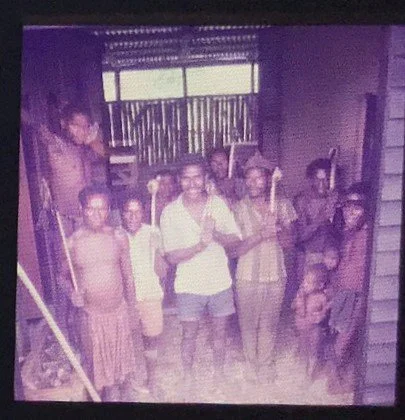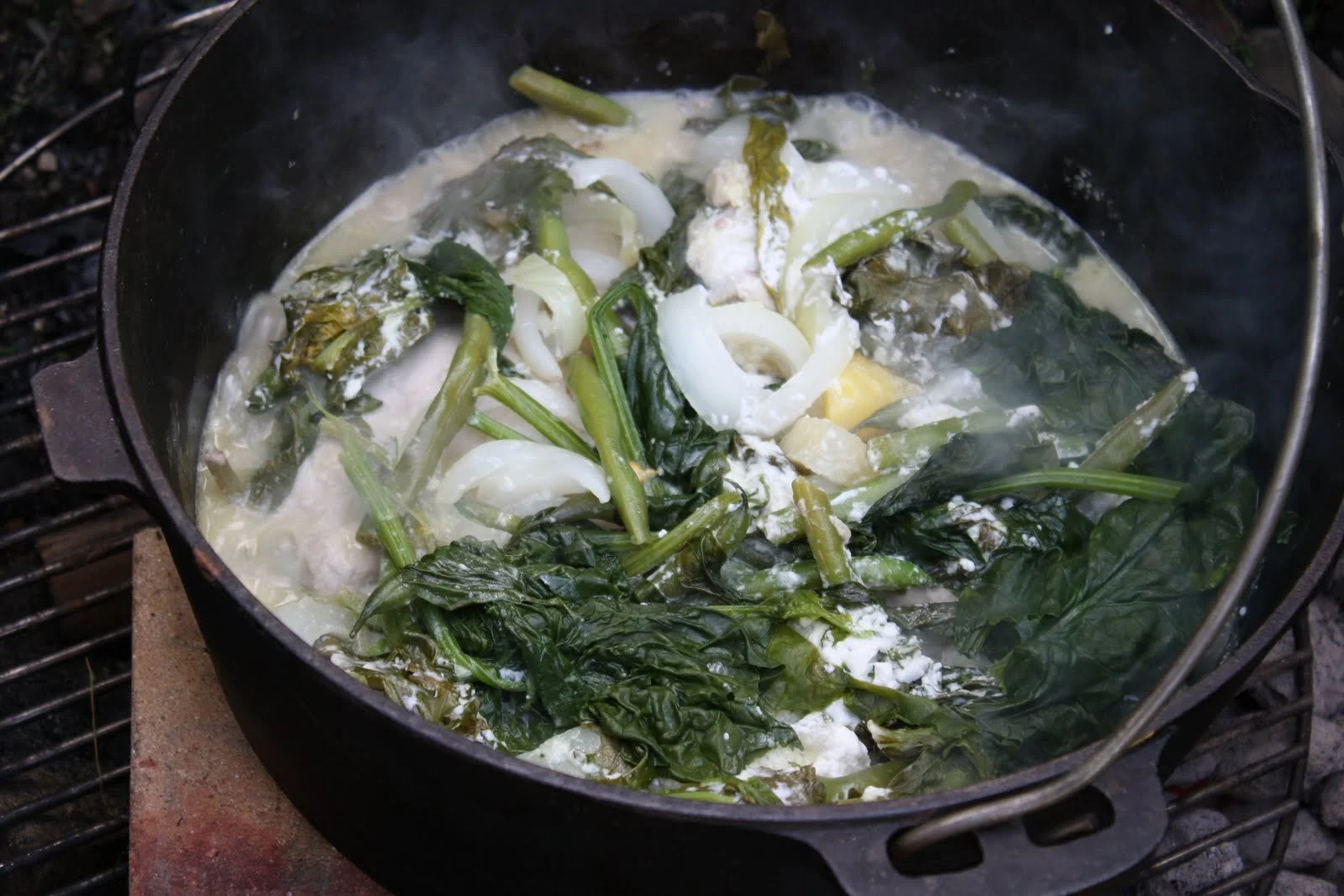Letters Ina wrote while Alvin was in the Highlands for a month
Photo 1: ‘back’ of Malalo hill. Photo 2: view of Village Buakup at foot of Malalo hill and overlooking ocean toward the north with Lae in the distance. Photo 3: Malalo church with view looking to the south with the isthmus of Salamaua in the background. The house would be just beyond the lower right corner of the photo.
The following letters that I found were copies and not the original that was sent so there was not envelope, and not always complete. Maybe the copying process cut off the bottom of letter. I think Ina was hoping to keep this info for herself and hoping to write about her PNG experience. But she ended up having a busy life.
Letter written by Ina Erickson from the Malalo Mission station to Durward and Estelle Titus Box 224 Route1, Carlos MN USA
1963 July 25 a copy of letter.
Dear mom, dad, Willa, and Martin,
All of the summer activities should be in full swing, and the house should be overrun with company, we hope that you don’t all overdo it. Thank you so much for the pictures. The weather is so humid that we have to really take care of the photographs, two of them were stuck together, so I guess when you put them into the envelope and put the faces together. I put them in water and they came apart with no damage either picture though. The card saying that Muggs had moved in with them? They always seem to manage to get in so deep. I wish everyone would let them alone for a little while, and let them catch up with themselves a little.
How is young Martin adjusting to all the attention of three sisters. I’m sure Mickey must’ve taken him over pretty much. Paula keeps talking about giving her ‘baby sissa, a bat, some powder on and diapers on’ so I’ve got my nurse made all trained. Tommy has no idea what she’s talking about.
I keep having contractions, it’s a little unnerving, but I don’t want to take a trip to Lae as I’m sure that the boat ride will make me go into labor if I’m just having false labor . I’ve still got six weeks to go. But so far it has worked to just sit tight.
Al sounds if he is enjoying his Highland trip. They should be back in about two weeks. Paula was quite impressed when I told her that her daddy had gone on an airplane and she was telling all the kids around here that her daddy went on a big airplane. Tom has finally learned how to ride the trike and does he think he is big cheese. It is so nice and cool now that it has rained every day since Al left two weeks ago. So we can’t complain of no rain anymore. Everything looks nice as it is reviving. Even my rosebushes are coming back to life again. It is nice to have our water tank full again.
I’ve been trying to get ready a little bit for the church dedication as with a new baby in the house. I don’t think I’ll get so very much done after it is born. I’ve redone some of the furniture, painting the kids beds, some of Al’s office furniture, and sanded and painted the refrigerator. They rust out so fast that every year or so you have to sand down all the rust spots and paint them. It is dark beige, and I’m hoping to paint the kitchen light beige soon. We need to put a new floor in the kitchen as some little vermin has been chewing away, and as Edna said, when they left, that most any day she expected to fall through the floor. Then we want to put in a new cupboard as these are made out of packing crates right after the war and do I have some trouble keeping the doors on, and never can keep them closed. I’ve nearly finished with curtains for the kitchen. I made some doilies by fringing material that I had around here to go with the curtains. I made some little curtains for the bedroom too. They are just simple ones, but the ones we had were so full of holes they hardly hang anymore. Actually, not really that bad, but Edna had them for years and years, and they were faded and full of holes.
I sanded and varnished a buffet that was in the living room. It had been painted over varnish and had chipped so badly. It took a lot of elbow grease, but I have it done finally. When my order for Montgomery Ward comes, I hope to cover my ‘Davenport’ with plastic. I got some cushions made out of kapoc. Kapoc is like milkweed that looks like cotton and grows on trees. We have to climb up and pick the pods before they explode all over -raining cotton on us all.
“Cotton” from the Kapoc trees.
I also got some mosquito nets made for the baby’s crib and basket, the diapers ready some nighties, made for when I’m in the hospital, and now I have packed our suitcases, so I guess things are pretty well in order for a quick takeoff.
Fortunately, the medical work has been light…..
1963 July 21 a copy -batch
Dear Mrs. Larsen,
We received your letter dated April this weekend. I do not know when your display is to be so thought best that I answer you as best as I can write away. My husband and I are relatively new in mission work as we haven’t completed our second year on the field yet. I don’t feel that we are experts in any field of the work , but I will share with you some of our observations and some of the activities that we find ourselves involved in. I’m sure you would rather hear from my husband but at present he is on a trip into the Highland area of New Guinea and I don’t accept him back for at least three weeks yet.
The diet of a New Guinea is very different from ours. I think it would be impossible for us to adjust to such monotony. They grow a staple food, usually sweet potatoes, or taro. They are both tuber vegetables that really don’t have too much taste, but are filling. In all of the books, I’ve been able to find on nutrition they don’t seem to be very high in vitamins, but the people seem to survive on almost this soul plant. They either roasted in the ashes of their fires, or boil it with salt in a pot like we do with potatoes. They eat it either hot or cold. For special feast, they mash it and pour coconut cream on it. This is made by grading fresh, coconut and pouring hot water over it and then they ring out the coconut and pour the cream over the taro. It tastes rather good. Rice has been introduced and people that work for Europeans, which is any white person, gets rations of rice for him and his family. They think they are pretty bad off when they have to eat rice for very long and especially brown rice, which we’ve been trying to encourage as it is so much more food value than what they eat at the present.
Protein in the diet is a problem as they don’t have much wild wild game to speak up except wild pigs. For the people living on the coast, they can collect seashells, shellfish and sea fish so they get along well, but the mountain people eat, bugs, beetles, small birds, and some chickens that they raise. They don’t seem to go in for chickens in a very big way. Here we would like to see cows tried as it seems that they have some lovely grazing lands, though they are a bit steep grades. New Guinea is all up and down with very little flatland.
Many new foods have been introduced as lettuce, cabbage, tomatoes, onions, sweetcorn, green beans, pineapple, beets, carrots, parsley. They grow these, mostly to sell as they aren’t used to them yet, so don’t eat them readily. Peanuts and potatoes also fit into this category. They have many varieties of bananas. Some are very delicious so one must cook or bake and some aren’t not edible. Coconuts to help supplement the diet of the coastal native. The chief industry of New Guinea is their gardening. This is the way almost everyone makes their loving. This is quite a job as I have mentioned before there is very little grounds. All gardening must be done on a slope, more often very steep than not. We have tremendous rain downpours as only the tropics can so much of the topsoil is washed away. That means they can use their garden space for only one or possibly two seasons. Then they, let it grow into a jungle again and have to clear new ground for their next season garden. They usually stand for about eight years before they can grow gardens in it again. This means that they must have lots of ground for very few people. Most places they make elaborate fences out of sticks, and buying them together with vines to keep the wild pigs out of the gardens.
This year has been unusual, because we have had it so very, very dry. The people have been very, very hard up for food, but at last the rains that usually come in March, have come in July, so there is some hope that they will soon have enough to eat again.
Lumbering is slowly, but surely coming into its own. They now make plywood out of a lot of it. There is a ship running directly from New Guinea to San Francisco, caring New Guinea, plywood and much to our delight. American products are being carried back so we can buy, salad dressing, blueberries, marshmallows, canned cherries, and apple for special treats now. This was unthinkable even a few months ago.
Many of the young boys work and live in compounds. They work on roads and construction for the government. They earn lemmings doing this.
Close vary considerably. From the well, dressed white shirt collar with nice looking shorts and a very few women wearing western dress too yet the heathen mountain people with their G strings and grass skirts. Most of the people in our area where loincloth wrapped around their waist, then the men may or may not wear a T-shirt or cotton sport shirt, and the women were not working, wear the mother Hubbard dress that the mission introduced when the missionaries first arrived. If they are working or walking, they often don’t wear anything above the waist. Actually, it is much more healthy as they don’t have the difficulties to keep their clothes, clean and often don’t have more than one or two dresses.
The young people that have been to school. Take great pride and dressing well, and have more than one or two outfits. Some of them look very very nice. Clothes are beginning to be a stature symbol here as they are in America. Housekeeping is relatively simple. Most people cook over an open fire, roasting much of their food right in the ashes, but as more and more people have pots and pans they are boiling some of it. I recently went on a camping trip with my husband and two children ages two and three, and we cooked over an open fire for two weeks and now I know why they’re cooking is kept very, very simple. It is most unpleasant to have smoke and eyes for very long. The fire is often in the middle of one room houses, which have a tin or some sort of material to keep the fire from burning through the floor. When it is nice, they frequently cook outside. Some of the progressive people have a separate shelter that they call a cook house to cook in.
1963 July 30 a copy
Dear Carol, (Ina’s Fairview classmate)
Thank you so much for your pictures of Katie‘s wedding. She surely was a lovely bride. Stan doesn’t look like I thought that I’d remembered him looking. I’m glad to that they could be back in Minneapolis for a while. I didn’t recognize Gayle. All of the girls look so different. I think perhaps I’d see your cousin before. At least she looked familiar when I saw the pictures. We surely will appreciate getting the anthropology magazine. Dr.Kuder, the president of the mission, always encourage the missionaries to read some of the anthropology books.
I sure am happy to hear things with you and Dave are going along well, will be waiting to hear about further developments. Dave really is a fine fellow, give him our greetings. We’ve had rain every night day for the last three weeks so we should have the water table back to normal. It is nice to have our water tanks full and not to have to, be concerned about water. The gardens are growing nicely too. So things are looking up. It is so lovely and cool. It makes me feel like a new person.
Al is on a month tour of the Highlands. He said that he talked with Bob Begley as he was passing through Madang for only a minute. I haven’t seen Naomi since they first arrived.1 I’m sure glad I was able to at least see her then. In a recent letter they sounded relatively happy. She’ll be a busy mama for a while.
Bagley, Robert and Naomi. 1962-1968. Erickson’s knew the Bagley’s. Ina Naomi were classmates at Fairview. Alvin and Bob were classmates at seminary
The New Guinea established churches, those that have had missionaries for a long time send out evangelist to the heathen parts of New Guinea. This really is what is keeping the local congregations going. Their interest in the heathen people in the Highlands, as most of the peoples in these areas are on the church rules, and that seem to have a deadening effect. Anyway, these congregations send out Christian men, often teachers to areas where the gospel hasn’t penetrated and often were white men aren’t allowed yet as the people are still savage. They live in the villages, sometimes for years before they get anyone interested in their God. Al is visiting all these men from the Malalo congregation, to see how things are going and to see if they are being sufficiently supported. Al and some of his letters says that in many areas they are begging for especially more teachers. In a lot of these areas there are missionaries stationed and without congregations, as the work is just getting started. Al says they really do have a lot to contend with. We have such a different task than they do. The gospel has been preached, and the people have already grown weary of it. Our job is to revitalize the church where there it is to penetrate the hard shell of fear and spiritualism. Even here we find people have difficult time getting away completely from what they think is the power of evil spirits. But, the heathen areas their lives are still governed by them. They don’t wear much more in their G strings and grass skirts, even in the very cold places. I’m so eager to hear what he hast to say when he gets home. He is going to be gone longer than he had planned as they have extended the trip while they are there to some more remote areas.
I hope you can drop in and visit us sometime. Katie (another Fairview classmate) was saying something like 1964 for you. She and Lilly, but since then the two of them aren’t interested in travel anymore, and it sounds like you might not be interested as you were, -my how things change. So Denise is married also -that is nice. I hope her husband is nice. How about Carmen? I haven’t heard from her for so long, does she have any prospects or any interesting social life.
I’ll be interested in any news you have from Lilly or about her. I guess I haven’t heard the news lately, so I didn’t know they were having trouble there, but I guess there isn’t many places were there isn’t trouble-is there?
One of our mission doctors that specializes in TB spent a few days with us. She did Manto tests on everybody in the school and some of our station people. Then looked at some of the patients that had been hospitalized, and released to live in their villages again. She was such a lovely person to have around, Dr Hoeger.2 She’s been on the field for about 30 years. She was the last woman to leave New Guinea, when the Japanese were invading. One of the other doctors, Dr. Braun was taken as a prisoner of war, and held for one year, life wasn’t very pleasant for him. He will be coming home on furlough now, so if you get a chance to hear him, I think it might be worth your while.
Thanks again for all your faithful letters, for the tape, and now for the magazine subscription, it really means a lot. God keep you in his wonderful, forgiving love, in Christ, Ina.
1 Bagley, Reverend Robert and Naomi. Evangelism, 1962-1968. The Erickson’s knew the Bagley’s. Ina and Naomi were classmates at Fairview. Bob was at the Seminary when Alvin was there.
2 Dr Agnes Hoeger, 1935-1967 Medical
1963
Mr. Orion Johnson
The international date,
437 California Ave.,
Palo Alto, CA
Dear Mr. Johnson,
My problem is medical. Our congregation has now built a dispensary, and we have some native nurses to run it, but we are very short of equipment. I would like very much to be able to help the ladies in our area have their babies as now, they deliver them in their dark, dirty houses with the aid of other village women. I would like to have you tell me where I could get a blood pressure apparatus, a scale for weighing the women, and autoscope, for quite reasonable. We of course need many other things, but these I feel are what we really need right now.
Sincerely Mrs Ina Erickson.
From Lutheran missions, Malalo.
1963 July 30 a copy
Dear George and Dorothy, (Ina’s aunt)
Oh, Dorothy, thank you so much for keeping the letters coming even if I don’t seem to get them answered very quickly. We really do appreciate them so much. I can bet that it is really lonesome after all of Marion‘s left. It gives you such a loss feeling until you can get adjusted again. I surely would like to see all of Marians again.
We have been having rain now, in fact, it has rained every day for the last 3 1/2 weeks, and we do appreciate it as it will take a lot of rain to fill up the streams, and to raise the water level again. The weather is so nice and cool we feel like human beings again. With heat for so long, we in the North Country, get rather dull and listless, lose all our ambition and ideas. Now we are starting to push these people again.
As I sit here, having a few labor pains, I think of the day two years ago when I was wandering around Alex with you and mother, both advising that I go to the hospital. Our boat has been gone for a week, and I’ve been a little antsy in the Highlands for another two weeks. He has been gone about three weeks now and I keep getting false labor pains. It is OK so long as they remain false, but I think I’ll go into Lae this weekend and get checked. From now on the boat will be here so I’ll have a little more peace of mind. At first I didn’t think I’d mind having a baby here, but as it becomes more and more, the possibility, the less than less I like it.
I was surely sorry to hear about Richard and poor Robert Sharp again. Such trouble that poor man has. Did you get your chairs all together again. I’ve been making some cushions for my Davenport. I have a frame made out of nice wood and springs out of bamboo woven. Then we made cushions out of Kapoc. It really doesn’t look too bad. I’m eager to hear about Al’s trip to the Highlands. In his letters he says that things are so different than they are here on the coast especially in the areas where there are no questions yet. He has been able to pick up a few souvenirs….
1963 August 13 a copy
Hello friends,
The best way to get to know one another is to sit down and have a chat, and since a few miles prevents this, I thought maybe I should have a little chat with you through my typewriter, and hope that some of you would do the same.
God has answered our prayers for rain, so things are looking considerably greener than they had and our people are eating again. Some of them have been able to harvest vegetables and can resume their business taking them to the market across the bay. As of yet there isn’t any road from this part of the country out to civilization, but there is talk of it someday. For now they take the boat, the Victor into Lae once a week.
Al has just returned from a month tour of the Highlands, where he has been visiting the native evangelist and teachers that have gone out from our congregation into the heathen areas to preach the gospel. He says it surely was an enlightening trip. The evangelist moved in with their families, sometimes into hostel villages, and sometimes into areas where the white men are not allowed yet and live quietly, learning the language, and about the people. They refrain from using magic to make their gardens grow, and have their own devotions, until some of the people are curious about them, and their God. It takes a long time, but they start telling some of the Bible stories, and then when they want to become Christians, they go to a baptismal class and are instructed in the teachings of the Bible. Many of the areas want teachers, so they see Christian areas besides them progressing.
The people there are very primitive. They were almost no clothes, although it very so much from leaves and G-strings to shorts, shirts and shoes, depending if they have had any contact with Europeans or with new Guineans that have had a lot of contact with Europeans. They live in filth and have to go so far for their water supply. Most of the villages are placed for defense rather than its convenience to water supply. So many times they have to go a very long way to get water. Maybe someday they can get tanks and catch their rainwater like we do. It may be a little unpredictable, but we usually have water. Al got all kinds of relics, including some bone tipped arrows. Before the war, a fellow came in with an arrow that had been in his ribs for quite a while to habit removed at the hospital, and the doctor discovered when he tried to pull it out that the bone had started growing – a good graft.
The area generally seem flatter than it is here. So they would be able to do much more with agriculture than our people. The rains won’t wash all of the good soil away as it does here. So as the people become civilized and Christianized, they will have some reasonable source of economic development. They have quite a few airstrips built way back in there so contact with the outside world for supplies and for missionaries that are now working in their areas will be going in soon. They really are crying for more evangelist and teachers to go up there as the people want to improve where they have seen their neighbors improve.
The inhabitants of our “station “ have been quite prolific lately. Our dog had seven puppies and we just had a calf. Several months ago we had a calf die. Paula or three-year-old daughter was really sad and kept referring to the fact that the calf had died, and when she saw the new calf, she said so happily “oh, calf wake up “and I thought that I was going to produce my own babe. Our boat had not been working for the past couple of weeks so it had been in dry dock being repaired and late. Al was still on his trip in the Highlands and I started to have labor pains, even though I’m not due for a couple of weeks yet. It was five weeks early then. Fortunately, it turned out to be false alarm and I’m still waiting.
We received the tape of the Easter service and are enjoying it very much. We will share it with the other missionaries as the chances arise. At Christmas time, rather than just after Christmas, many of the missionaries, take their vacations and some of them like to come to Malalo as we have a very lovely swimming beach, with some lovely coral reefs to explore. And we have a lovely view of the peninsula of Salamaua from my kitchen window.
The big event in Malalo, we hope, is the dedication of a permanent church in November. We hope to have it finished by then. They are working on the painting and making of benches. It really is a beautiful church and will try to get colored slides pretty soon….
1963 August 16 a copy
Dear Inez and Charlie, (Ina’s aunt)
Don’t be sorry that I heard about your problems. Friends and relatives are present to help and sustain each other in times of trouble. I’d have felt real bad if just because we are separated by miles, that I should have to be separated, and in thought and action, too. I know I can’t be of help so far away, but I can join you in prayer and that is a powerful weapon to overcome our trials. God has promises to sustain us, and to give us strength for each trial that we are called upon to endure. It seems a shame that innocent people have to suffer for the sins of others, but that seems the way our sinful world works. It sounds to me like you would be doing Ralph a great favor by taking him to court. I think you could talk this over with his folks, but it does seem like it would help him to face his responsibility so it doesn’t happen again to him and help you with a financial burden that it is. I know it won’t reverse any of the circumstances, but I do think it would help. Ralph will always have this hanging over his head, and you could explain this to his parents, as I know you probably don’t want to make enemies with them. Bill Leslie could probably help you, or refer you to someone who could help you, or you could work through Ellen’s social worker. Sometimes it is necessary to forcibly make people face their responsibilities and curb their passions. Prayerfully consider this before you just let it pass. I hope that Ellen is feeling better and that she doesn’t have too much trouble and delivery.
It is a hard decision to make, what to do with the baby, but you do know that if she does give it up, it will have a good home, as they are so careful about child placement.
I’ve been feeling real good. I’ve been having contractions for sometime now, so thought I might go early, but now they are quieting down again, so will probably go over due. I don’t really mind so long as we have a healthy baby. That is really asking a lot I know. Tommy and Paula are growing. Tommy is going through his terrible twos with tantrums at any displeasure. It is so different for Tommy as he is usually so good natured, and acts as a calming effect on stormy Paula. Now the situation is reverse, and Paula is always trying to pacify Tommy. We have one trike and about 10 kids to ride it so it usually is the focal point of the disagreements. Tommy jabbers and jabbers. I do get a bang out of their conversations. At times they sound so grown up. Tommy was helping me make donuts the other day. He was dipping the donut cutter and melt before cutting the donuts. Paula makes the beds and clears the table. She is a lot of company. She decided today wasn’t a good day to get the “baby sisso” as it was raining. She thought after the rain stopped it would be time enough.
Al enjoyed his trip to the Highlands. He says that it really is a lot different from the coastal areas. We think that people here are primitive, but they really live from hand to mouth. The heathens live in filth with no imagination whatsoever in their lives, no real pleasures, and no clothes, though the weather gets very cold at times. He was able to get some pretty good pictures, but we will have to send home pretty soon. He got quite a few relics, human bone tipped arrows, bows, stone bowls, some idol stone, and axes. Some of the native evangelist really have to put up with a lot. Some, of course have been accepted and helped by the people, so they don’t have it so bad. Many of them are crying for teachers, as they want to progress like some of their neighbors. There are such extremes. We need to pray for the work of the Holy Spirit in their lives.
1963 August 18 from Fricki’s
Dear Al and Ina,
How are things going? We are listening every night to whether you have had another boy or girl.
We are sorry you couldn’t come along with Al to our little outback. I’m afraid Al didn’t get much rest here but his visit really helped the situation at Ponampa. After seeing those three coastal at work, I think they are ready to take over more of the responsibility. Their visit helped clear the air. You’ll never know what a pressure it was, and the nicer relief felt.
The Kiap, came through today, and said he was going to stay until the road was finished. They want to reroute the road right where we want to put the house. So now we have to clean that up.
Hope you can all come in sometime soon. How about just before conference? I’ll probably make a trip into the Lamair in January. It will be the second time missionary has been back there. Al might like to see some real bushies.
Enclosed is a record for your enjoyment. Keep it.
Greetings to Phyllis.
Vince and Barb
PS if you can’t come, then, of course you are welcome anytime. Should have the house finished by July.
Fricki Vince and Barb and Bob Jamison circa 1961 in Minneapolis
1963, August perhaps
I think this letter is written in summer of 1963 - probably July. Ina includes writing about how pregnant she is ( she gives birth to Kristin August 28, 1963).
Letters from Papua New Guinea.
Letter written by Ina Erickson from the Malalo Mission station to Durward and Estelle Titus Box 224 Route1, Carlos MN USA
Ina has obviously included photos with this letter so I have searched through the files of photos and included what I think she is talking about.
The one with the five girls standing beside a large building, is a side view of the new church, the girls are our nurses, except for the one on the far right, and she is planning to start nurses training shortly. The groups are the Sunday school class. I was trying to set them to show they’re offering up cucumber, corn, taro and what have you, but they were very bashful about displaying the food.
The one of the front of the new church is the people coming out of the old one going to their homes, rather than going into the new building. They are now painting it. I’ll help them figure out how to make the benches, an altar will have to be made, and a lot of finishing work will have to be done.
The photo of Tommy is him coming from the church, he completely stripped down except for his shoes, by the time he got to the top of the hill. That is the kitchen on this end. On the side where it looks like the house continues onto the right, it just a little alcove for the stove, with windows on three sides to keep it from getting so hot. The first mission houses had a stove completely outside in another little house, so you had to go outside to cook all of your meals.
One photo is of Paula, Phyllis and Tommy are ready for church, the mailbox is for native out going mail as we are the post office also.
Another photo is of two girls holding Paula and Tommy which are our present house girls. Katamango is holding Paula and she is from the mountains, the area we just visited and we went to her village. She helped me while we were there, and the other is Gemaluo, a coastal girl whose father is a teacher in a nearby village. They are standing by the house they live in while working for us.
Another photo is the small building with the steps which is Al’s office and workshop. The veranda is the entrance to his office, and the other door is the workshop. We hope to make a guestroom as soon as we get some storage room available by building a new girls house. The white ants damaged the old one so the building they now live in, is the old trade store. But the natives took over that one recently but they just built a new building in their village so we have the building to use. But it doesn’t meet the government requirements to our house the students so as soon as we can get a carpenter, we will build a new one.
The dormitory still isn’t done after a year, and would take only one afternoon if the whole village got busy on it. Al told them he is going to dismiss one boy from each village a week until they get it done. They don’t need to have boys in school if they can’t provide houses for them. I’ve seen several days that people have gone down to work on it so maybe soon they will have it done. Al will be making a trip to the highlands to see some of the evangelists from our area that are working there to see how they are doing and if they need anything. I think he will be gone for about a month.
Paula is filling out some now so her little face is getting round and her ribs are disappearing. Tommy stays the same, but his stools look real good, and he eats well, so I’m not too worried. Paula is so much company. I’ve been telling her about the coming of a new baby so she keeps looking for it. She thought that Metegemeng’s baby was going to come to live with us. I’m really eager to see what their reaction will be when we do bring it home. It’s surely is active (Kristin). I am so big now. I puff an puff around. I’ve been feeling really well. The weather has cooled some and we have been having numerous gentle rains. Things look much better. Our fruit trees have been producing abundantly so we have been able to keep our school boys and girls supplied a little bit.
1963 Kristin and Michael and Rueban (oldest boy) - sons of Metegemeng the captian of the Victor. His wife and baby that is not much older than Kristin
Al bought some steel towers used at the old airport at Salamaua before the war. We hope to dismantle them to make posts for our cow yard. If we can get a fence to stay and one good milking cow, then I think we won’t have so much trouble with the cows eating the neighbors gardens and get a little more milk for all our trouble. I don’t need to teach my kids to sit with books, mother. They are always after someone to read to them and like us to tell them all of the ABC’s are and count everything. Tom says 1 2 3 4 7 and no matter how many he sees it’s always seven he winds up with.
We do miss you all and love you much. We enjoy Malalo a little more after a little break. I have most of the baby’s things ready as it looks like we will be getting a lot of company again soon. I plan to go to Lae about a week before the baby is due if I don’t have to deliver within the week, Dr. Todd said that he would induce me. I’ve talked to the people from the sawmill and they would be willing to stay with the kids here at Malalo while I’m in the hospital, as according to mission policy. Al and Phyllis can’t stay on the station alone together, and then we’d have to fold up everything for two or three weeks while we waited for me. So I hope things go according to plan.
Love Al, Ina and kids
1963, August 13.
Letters from Papua New Guinea.
Letter written by Ina Erickson from the Malalo Mission station to Durward and Estelle Titus Box 224 Route1, Carlos MN USA to distribute to sponsors and friends.
A copy of the letter was sent to Gertrude Rassmussen later.
To Gertrude
Hello friends, the best way to get to know one another is to sit down and have a chat and since a few miles prevents this, I thought maybe I could have a little chat with you through my typewriter and hope that some of you would do the same. God has answered our prayers for rain, so things are looking considerably greener than they had, and our people are eating again. Some of them have resumed their weekly trips to lay to the market to sell their vegetables so the boats are back in business taking them across the bay. As of yet there aren’t any roads from this port of the country out of civilization, but there is talk of it someday.
Al just returned from a month tour of the highlands where he has been visiting the native evangelist and teachers that have gone out of our congregation into heathen areas to preach the gospel. He says it surely was an enlightening trip. The evangelist move in with their families, sometimes into hostile villages, and sometimes into areas where white men aren’t allowed yet. They live quietly learning the language about the people. They refrain from using magic to make their gardens grow, and have their own devotions until some of the people are curious about them and their God. It takes a long time they start telling some of the Bible stories and then when they want to be Christians, they go to a baptismal class and are instructed in the teachings of the Bible.
Many of the areas really want teachers as they see Christian areas beside them progressing.
The ‘inhabitants’ of our station have been quite prolific lately. Our dog has had seven puppies and we had a calf several months ago and we had a calf die. Paula, our three-year-old was really sad and kept referring to the fact that the calf had died and when she saw the calf, she said, so happily ‘oh, calf wake up’. And I thought that I, too, was going to produce a baby. Our boat had not been working for the past couple of weeks so it had been in drydock being repaired in Lae. Al was still on his trip in the Highlands and I started to have labor pains. I am not due for a couple of weeks yet, but it was five weeks early then. Fortunately, it turned out to be a false alarm and I’m still waiting.
We received the tape of the Easter service and are enjoying it very much. We will share it with other missionaries as the chances arise. At Christmas time, rather just after Christmas, many of the missionaries, take their vacations, and some of them like to come to Malalo as we have a very lovely swimming beach, with some lovely coral reefs to explore. And we have a lovely view of the peninsula Salamaua for my kitchen window.
The big event at Malalo soon, we hope, is the dedication of the permanent church in November. We hope to have it finished by then. They are working on the painting and making the benches. It really is a beautiful church, will try to get colored slides of it pretty soon.
Being ladies, maybe you would be interested in hearing about a New Guinea housewife and some of her duties. Like any other country, she must prepare the food and care for the children. They really work hard as they must care for the gardens, their soul means of food. The gardens are on about 85° angle slopes, so no machinery can be used. They’re only implements are big bush knives with a blade about 18 inches long and sticks to till the soil with.
Housecleaning is made simple, by not having any furniture. Some more progressive households have a shelf or two, but it is the exception rather than the rule. Some that have been away from the village have made tables, chairs, and an occasional bed when they have returned. The floor is made of bamboo strips about half inch apart and lashed together with vines. Any liquid that spills just goes through and sweeping with a handful of leaves, branches or weeds is simple as everything goes through the floor. All of their cooking is done over an open fire, so they don’t get very fancy and food preparation. Taro and sweet potatoes are their basic foods. They usually peel it and boil it as we do potatoes. Though sometimes they cook it in the coals of the fire for special occasions. They will mix it with coconut cream made out of freshly grated coconut and then you pour hot water over it and squeeze it and the liquid is then mixed with the taro so we have a substance like mashed potatoes with a little musky taste to it.
Meat when they have, it is usually boiled, either in a pot or in a green bamboo stick with banana leaves as they don’t have grease for frying anything. Most vegetables are eaten raw but the corn on the cob and young bamboo sprouts are roasted in the coals. Pumpkin is boiled. The one thing they bake is they call poom or bread. It is a rich mixture of coconut cream and taro. Then to bake it, it is rolled in banana leaves. They dig a hole, then put very hot stones in it, and place the poom on top of them. Then add more hot stones, replacing them as they get cold until it is baked clear through. With butter on it, it taste pretty good, but it is so rich that we can only eat a little bit.
Landry is usually done in a stream with a large rock as a scrub board. As people are making money, they buy soap, otherwise they just rub until it is reasonably clean.
We surely do appreciate your prayers, interest and support of God‘s work here in New Guinea. It really is getting to a critical time in New Guinea with all of the changes that is taking place so rapidly. It is hard to say how long the white man will be able to labor here. God‘s blessings to all of you.
Sincerely, Al and Ina Erickson
Ina adds this note in the top margin:
This wasn’t a form letter to be mailed out. I’m still working on Al for that. I was writing a letter to some ladies at Alexandria and thought I’d make a copy for you in case there is something of interest to someone. By the way, a little girl arrived at our house on August 28 in the hospital I mean. She was 7 lbs. 7 oz. and we call her Kristen Judith. She has brown curly hair and blue eyes.













































